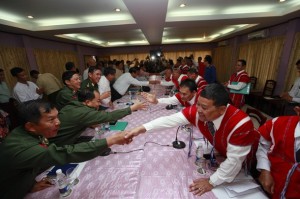Mu The village is in a tight spot. Not only is it in Karen National Union-held territory abutting Burmese government-controlled territory, but it is geographically remote as well. Virtually no outside aid made
its way in during the long-running civil war that has only compounded the village’s isolation.
This situation changed abruptly in August 2012, when a single truck laden with medical supplies, rice, and clothing braved trying conditions to deliver aid to Mu The village. Workers patched by hand stretches of road damaged by unprecedented floods just weeks prior, and area authorities had to steer the group clear of an aged landmine lurking just below ground, according to a Karen Human Rights Group report. At the end of the arduous journey, the villagers welcomed the bounty of goods the aid truck delivered.
“We can say that the implementation of the project was successful,” said Saw Steve, chairperson of the Committee for Internally Displaced Karen People, which assisted with the project. “We have to give credit to those who were involved, and tried hard to make the project possible, including our workers, other organizations that had coordination with us and the people in the community themselves. Many people would expect that the project would fail.”
The aid truck was part of a greater project bringing aid coordinated by the Myanmar Peace Support Initiative to remote villages east of Kyauk Kyi. News that the MPSI, launched in March 2012 to foster peace in Burma, will likely end this year has left community leaders reflecting over what they call a mixed legacy, and equipped them with new ideas moving forward.
The Norway-led MPSI’s entrance into the peace process in March 2012 was dogged by allegations of moving too quickly, especially from observers among the several Thai-Burma border groups.
“It was rushed, as they wanted to test the sincerity of both the government and KNU in delivering humanitarian assistance to the conflict-affected areas,” Saw Steve said. “They wanted to grab that opportunity as quickly as they could in order to test the situation. The process was weak at the beginning, and there were things that went wrong, but I think the mistakes were also minimized as the process continued, and it does get better at the end.”
Read more: Karen News

